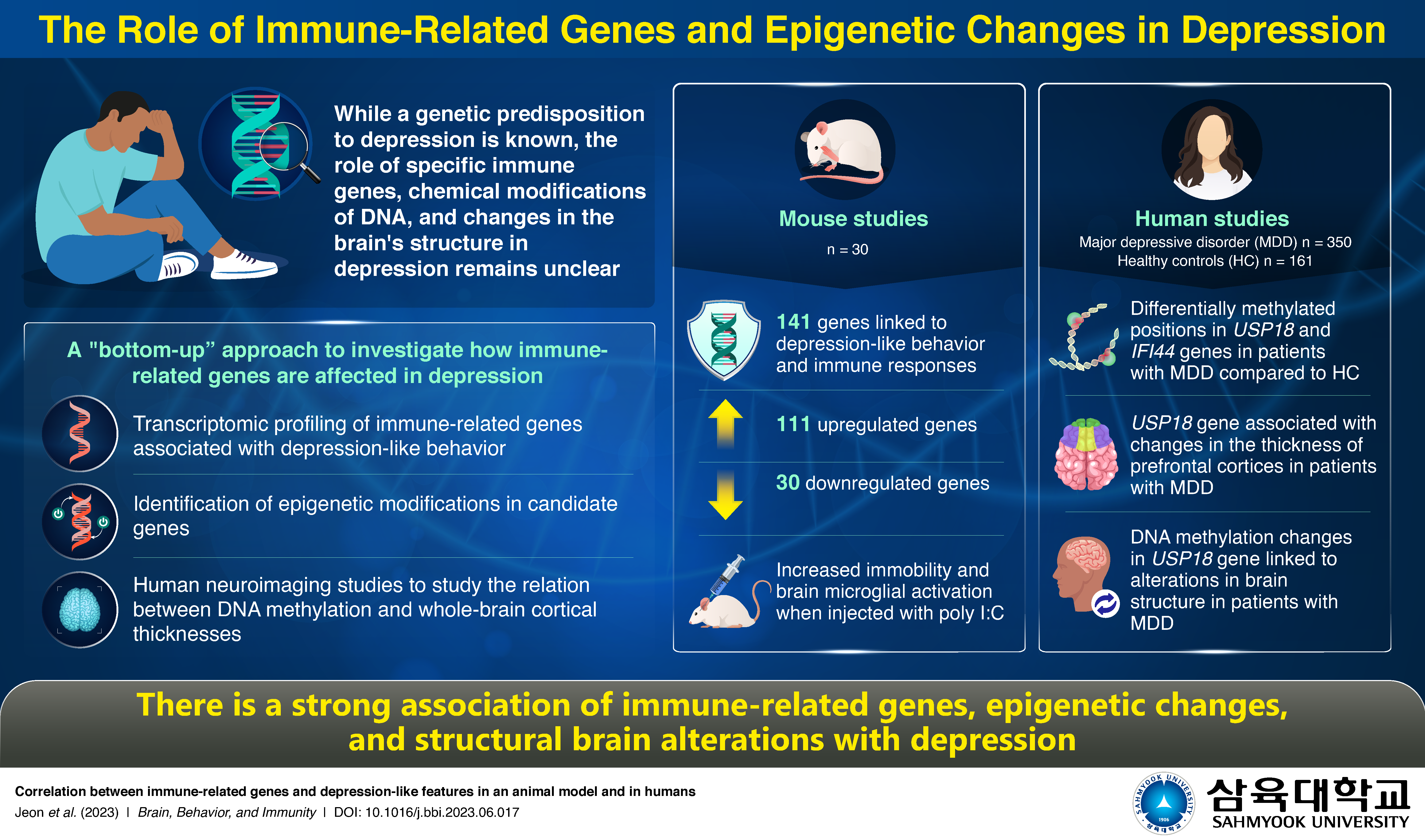Sahmyook University Researchers Uncover Molecular Pathways Underlying Depression
2023-08-29 1,154
The study offers insights into the genetic and epigenetic mechanisms underlying depression through combined mouse and human studies
Scientists from Korea University Anam Hospital, Konkuk University, and Sahmyook University explored the link between gene expression, DNA methylation, and brain structural changes in depression. By analyzing gene interactions in mice subjected to behavioral tests, they identified 141 genes primarily linked to immune responses correlating with depressive behaviors. Parallel findings in humans underscored the involvement of interferon-related genes in major depressive disorder. These insights open new avenues for potential therapeutic targets and deepen our understanding of depression.

Depression is a common mental health problem that affects people across demographics. Scientists have long known that there may be a genetic component that confers predisposition to depression, but the specific underlying mechanisms have remained elusive. Growing evidence indicates that inflammation and immune-related processes in the brain could play a significant role in depression.
A team of researchers including Dr. Se Jin Jeon from Sahmyook University conducted a study to gain deeper insights into these mechanisms. Their study was made available online on 26 June 2023 and was published in October 2023 in Volume 113 of the journal Brain, Behavior, and Immunity.
The team employed a mouse model to measure their immobility, a behavior linked to depression, using a forced swim test. Through transcriptional profiling, they found that 141 genes significantly correlated with immobility, with 111 upregulated and 30 downregulated. “We found that these genes were related to the interferon pathway, which is involved in the regulation of inflammation in the body”, explains Dr. Jeon enthusiastically. The researchers further validated their findings through real-time PCR, confirming that immune-related genes were expressed at higher levels in mice with higher immobility scores. Additionally, they induced immune responses using an intracerebroventricular injection, which resulted in increased immobility and microglial activation, providing further evidence regarding the link between immune response genes and indicators of depression.
Leveraging the findings of murine study, the team aimed to understand the link between DNA methylation, brain structural changes, and depression in humans. For this, 350 patients with major depressive disorder (MDD) and 161 healthy controls were examined. DNA methylation analysis—a technique used to study the epigenetic modifications on DNA—was conducted on the genes USP18 and IFI44, since these were found to be associated with depression-like behavior in mice and were involved in interferon signaling pathways. The researchers found differences in methylation patterns between patients with MDD and controls. In patients with MDD, DNA methylation of a specific region in the USP18 gene correlated with reduced thickness in several brain regions associated with emotions and cognition. Meanwhile, in the control group, DNA methylation of another region in USP18 correlated with increased thickness in brain regions linked to vision and sensory processing. These findings link not only the expression of immune-related genes, but also their epigenetic status and their effect on brain structure, with depression.
“In summary, we found elevated expression of inflammation-related genes in patients with depression compared to controls. This can increase inflammatory conditions in the body, including the brain, and ultimately lead to structural abnormalities in brain regions involved in emotional regulation, which may contribute to the development of depression”, concludes Dr. Jeon.
Thus, with the potential to serve as viable treatment targets, these immune genes offer an alternative approach or supplement to the currently approved pharmacologic treatments.
Reference
Title of original paper: Correlation between immune-related genes and depression-like features in an animal model and in humans
Journal: Brain, Behavior, and Immunity
DOI: 10.1016/j.bbi.2023.06.017
About the institute
Sahmyook University is situated in metropolitan Seoul, South Korea. The university is renowned for its pristine campus, earning the title of "Korea's most beautiful university." Its commitment to environmental sustainability is reflected in its eco-friendly construction. The university prides itself on its unique holistic academic counselling system in which students and professors organically work together in receiving and giving guidance. Comprising six colleges, including the College of Theology, Humanities & Social Science, and Health Science & Social Welfare, as well as four graduate schools, Sahmyook University provides a comprehensive educational experience.
Website: https://www.syu.ac.kr/eng/
About the author
Dr. Se Jin Jeon received a Ph.D.in Pharmacology from Seoul National University and completed her postdoctoral training at the University of California, Los Angeles, USA. Currently, she is teaching pharmacology and new drug development as an assistant professor at the Department of Bio Convergence Engineering at Sahmyook University.
Scientists from Korea University Anam Hospital, Konkuk University, and Sahmyook University explored the link between gene expression, DNA methylation, and brain structural changes in depression. By analyzing gene interactions in mice subjected to behavioral tests, they identified 141 genes primarily linked to immune responses correlating with depressive behaviors. Parallel findings in humans underscored the involvement of interferon-related genes in major depressive disorder. These insights open new avenues for potential therapeutic targets and deepen our understanding of depression.

Depression is a common mental health problem that affects people across demographics. Scientists have long known that there may be a genetic component that confers predisposition to depression, but the specific underlying mechanisms have remained elusive. Growing evidence indicates that inflammation and immune-related processes in the brain could play a significant role in depression.
A team of researchers including Dr. Se Jin Jeon from Sahmyook University conducted a study to gain deeper insights into these mechanisms. Their study was made available online on 26 June 2023 and was published in October 2023 in Volume 113 of the journal Brain, Behavior, and Immunity.
The team employed a mouse model to measure their immobility, a behavior linked to depression, using a forced swim test. Through transcriptional profiling, they found that 141 genes significantly correlated with immobility, with 111 upregulated and 30 downregulated. “We found that these genes were related to the interferon pathway, which is involved in the regulation of inflammation in the body”, explains Dr. Jeon enthusiastically. The researchers further validated their findings through real-time PCR, confirming that immune-related genes were expressed at higher levels in mice with higher immobility scores. Additionally, they induced immune responses using an intracerebroventricular injection, which resulted in increased immobility and microglial activation, providing further evidence regarding the link between immune response genes and indicators of depression.
Leveraging the findings of murine study, the team aimed to understand the link between DNA methylation, brain structural changes, and depression in humans. For this, 350 patients with major depressive disorder (MDD) and 161 healthy controls were examined. DNA methylation analysis—a technique used to study the epigenetic modifications on DNA—was conducted on the genes USP18 and IFI44, since these were found to be associated with depression-like behavior in mice and were involved in interferon signaling pathways. The researchers found differences in methylation patterns between patients with MDD and controls. In patients with MDD, DNA methylation of a specific region in the USP18 gene correlated with reduced thickness in several brain regions associated with emotions and cognition. Meanwhile, in the control group, DNA methylation of another region in USP18 correlated with increased thickness in brain regions linked to vision and sensory processing. These findings link not only the expression of immune-related genes, but also their epigenetic status and their effect on brain structure, with depression.
“In summary, we found elevated expression of inflammation-related genes in patients with depression compared to controls. This can increase inflammatory conditions in the body, including the brain, and ultimately lead to structural abnormalities in brain regions involved in emotional regulation, which may contribute to the development of depression”, concludes Dr. Jeon.
Thus, with the potential to serve as viable treatment targets, these immune genes offer an alternative approach or supplement to the currently approved pharmacologic treatments.
Reference
Title of original paper: Correlation between immune-related genes and depression-like features in an animal model and in humans
Journal: Brain, Behavior, and Immunity
DOI: 10.1016/j.bbi.2023.06.017
About the institute
Sahmyook University is situated in metropolitan Seoul, South Korea. The university is renowned for its pristine campus, earning the title of "Korea's most beautiful university." Its commitment to environmental sustainability is reflected in its eco-friendly construction. The university prides itself on its unique holistic academic counselling system in which students and professors organically work together in receiving and giving guidance. Comprising six colleges, including the College of Theology, Humanities & Social Science, and Health Science & Social Welfare, as well as four graduate schools, Sahmyook University provides a comprehensive educational experience.
Website: https://www.syu.ac.kr/eng/
About the author
Dr. Se Jin Jeon received a Ph.D.in Pharmacology from Seoul National University and completed her postdoctoral training at the University of California, Los Angeles, USA. Currently, she is teaching pharmacology and new drug development as an assistant professor at the Department of Bio Convergence Engineering at Sahmyook University.


